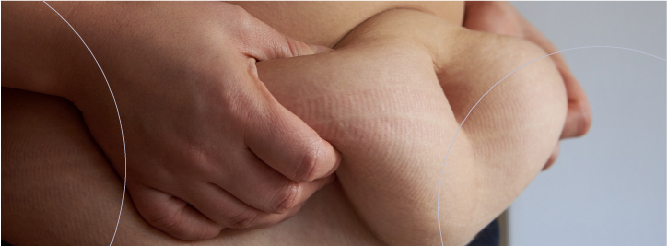
Life is full of constant changes, from the moment we’re born and throughout all the years that follow. These changes can be caused by several circumstances and they can affect us in several ways; they can alter our social life if we change schools or jobs; they can affect our mental health if they were sudden or unwanted changes, and they can even influence how our bodies respond to them, by either gaining or losing weight. If you’re unhappy with the results of these changes, there are steps you can follow to undo them or help you come to terms with them.
It’s no question that women go through a long series of physical changes throughout their life, they have to deal with hormone fluctuations due to their period, pregnancy, contraceptives, or any other type of imbalances that can be caused by high stress, insufficient sleep, an unhealthy diet, diabetes, thyroid problems, and other conditions. Some of the biggest changes that women face are those that come with pregnancy and after the birth of their child. From weight gain to postpartum depression, the lives of women are upended and getting to the point they were in before their pregnancy can be slow paced and tiring.
Many of the patients that arrive at LIMARP® are struggling with losing the weight they gained during their pregnancy, especially when it comes to the sagging skin that remains after the birth of their child.
As part of our integrative treatment program, we offer our patients personalized plans that meet their needs and goals, and in this case, their lifestyle. We know many aspects of life change during maternity, so we want to ensure that the treatment you receive goes in line with your day to day activities. Once you arrive at your appointment, one of our doctors will go over your medical history and they will talk with you about your expectations in order to create a plan that will help you achieve them.
This article will focus on how the body changes during and after pregnancy
Why it is hard to lose the weight that was gained, and the steps you can follow to reach your goals. As always, we’d like to remind you that each case and body is different, and what may work for some women in a certain time frame does not always apply to others.
So, what are the main body changes we can witness when a woman becomes pregnant?
According to the American Pregnancy Association[1], “some changes can be subtle, like an increased respiratory rate, while other more obvious changes include a baby bump”. All these changes occur so the baby develops properly and your body is ready to give birth. As it was mentioned, the baby bump or any changes to the abdomen are some of the obvious signals of change because of the gained weight; while the extra pounds can be worrisome, but it’s important to point out that there’s a healthy amount of weight you should gain to ensure that your baby is getting the nutrients it needs.
This, of course, varies from women to women and the weight they were at before their pregnancy. The standard amount of what you may or should gain depends if you’re underweight, overweight, or obese. For example, if you’re underweight, you should gain around 28 to 40 pounds; if you’re at a healthy weight, 25 to 35; if you’re overweight, you shouldn’t go over 25 pounds, and if you’re dealing with obesity, you should gain up to 20 pounds[2].
We understand many women worry about gaining weight during their pregnancy, but it’s also important to understand that limiting your food intake can be harmful for both you and the baby, as well as eating too much. Some of the ways you can maintain healthy weight throughout your pregnancy is by sticking to a balanced diet composed of whole food and by staying active, keeping in mind that your exercises should be adapted according to the different stages of the pregnancy.
Once you’ve given birth, it can take up to 12 months for you to go back to your pre-pregnancy weight, and while every weight loss journey is different, most women start losing the baby weight in the six weeks following the birth[3]. This is because everything that shifted inside their bodies start going back to a state of normalcy, for example:
- The uterus shrinks back down, which reduces the swelling around the abdomen.
- The loss of the placenta and amniotic fluids can also reduce your weight because you’re releasing stored fluids.
- And of course, giving birth to your baby is also significant because a healthy one weighs between 5 ½ and 8 ¾ pounds.
What’s harder to lose is the fat your body stored during the pregnancy, especially if you gained more than the average weight recommendation.
One of the many obstacles that may be present is frustration of not being able to lose weight at the rate you want to, but it’s important to keep in mind that your body created a whole human being and that it needs time to rest and recover. Once your doctor clears you, you’ll be able to start a diet that’ll help you lose weight, as well as partake in the physical activity of your choice. A 2014 study that focused on weight retention following a pregnancy, concluded that “combined nutrition and exercise interventions can achieve weight loss”[4].
One reason your doctor may advise that you wait a few months before cutting back on calories is the impact it may have on breastfeeding.
If you’re breastfeeding, you’ll need around 500 more calories to produce a healthy amount and not eating enough or healthy enough can alter or stop your production levels. However, once you’re given the green light, you can start cutting back on calories by focusing on eating whole foods, such as fruits, vegetables, whole grains, and lean protein.
Also, you’ll find that breastfeeding can also help you lose weight because you burn calories while doing so; in fact, for most women it can help you get back to your pre-pregnancy weight without doing much else because it stimulates the release of hormones that help shrink your uterus and your post-baby belly[5]. Keep in mind that this drop in weight is not immediate, especially in the first months, because of the increased calorie needs and intake, as well as reduced physical activity during lactation. The natural ways your body loses weight and breastfeeding may not be enough to lose all the weight you gained during your pregnancy, which is why we’ll continue to list the different ways you can reach your ideal weight in a healthy and safe way. As always, we’d like to highlight that it’s important that you find what’s best for you and your schedule, especially as a new mom.
First, we recommend you keep your goals realistic. While the gained weight can be lost, pregnancy causes lasting changes in the body, like wider hips and waistline. This can make it harder for you to see notable changes in the first months, but remember that it’s important to stick to your routine and to keep eating healthy foods. Here are some recommended steps[6] you can follow to reduce your calorie intake without limiting the amount of nutrients you consume:
- Do not skip meals because you will have less energy and it will not help you lose weight. We recommend you start with a complete breakfast so that you have enough energy to start the day; also, healthy snacks, such as fruits and nuts, are recommended when you grow hungry throughout the day, in addition to your main meals.
- Drink at least 12 cups of fluid a day, this can be easier by keeping a water bottle near the spot where you usually feed the baby.
- Avoid products with artificial sweeteners like sodas, juices, and other processed beverages. Try sticking to freshly squeezed, natural juices or just fruit if you’re looking for something sweet. This way, you’ll also get the fiber, vitamins, and nutrients your body needs.
- When it comes to your meals, limit any processed foods that are high in saturated fats and excess sugar. These types of meals can be easier to make, especially during a period where time is limited. If you need help sticking to a healthy diet or need tips on how to eat healthier when you have time constraints, get in touch with your dietitian so they can develop a diet plan that fits your needs.
Once you’re cleared for exercise, we suggest you talk to a professional trainer so that they can recommend the best fitness routines that go according to your goals. Be mindful of not trying to do too much, too fast, and that starting small is the best way to ensure that you get the best out of your workouts. Research[6] has found that resistance training or lifting weights is one of the best ways to lose weight and retain muscle mass; it also has other health benefits, especially cardiac ones, that will benefit you in the long run.
Contact Us to Learn More
If you’ve recently given birth and are struggling to lose the weight you gained during your pregnancy, schedule an appointment with one of our doctors. We can help determine the right treatment for you. Contact us online anytime or give us a call at (619) 373-0229.
References
[1] “How Your Body Changes During Pregnancy”. https://americanpregnancy.org/healthy-pregnancy/changes-in-your-body/body-changes-during-pregnancy/. (Accessed July 31st, 2022).
[2] “Weight Gain During Pregnancy”. https://www.cdc.gov/reproductivehealth/maternalinfanthealth/pregnancy-weight-gain.htm. (Accessed July 31, 2022).
[3] “Losing weight after pregnancy”. https://medlineplus.gov/ency/patientinstructions/000586.htm#:~:text=A%20healthy%20diet%20combined%20with,routine%20for%20fast%20weight%20loss. (Accessed July 31, 2022).
[4] Berger AA, Peragallo-Urrutia R, Nicholson WK. Systematic review of the effect of individual and combined nutrition and exercise interventions on weight, adiposity and metabolic outcomes after delivery: evidence for developing behavioral guidelines for post-partum weight control. BMC Pregnancy Childbirth. 2014 Sep 10;14:319. doi: 10.1186/1471-2393-14-319. PMID: 25208549; PMCID: PMC4176850.
[5] “Losing the Baby Weight: The Truth About Postpartum Weight Loss”. https://www.whattoexpect.com/first-year/losing-baby-weight. (Accessed July 31, 2022).
[6] Clark, J.E. Diet, exercise or diet with exercise: comparing the effectiveness of treatment options for weight-loss and changes in fitness for adults (18–65 years old) who are overfat, or obese; systematic review and meta-analysis. J Diabetes Metab Disord 14, 31 (2015). https://doi.org/10.1186/s40200-015-0154-1


